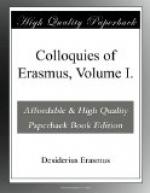Th. How far God is against Sacrifices, he himself teaches us in the first Chapter of the Prophecy of Isaiah. There were certain legal Obligations among the Jews, which were rather Significations of Holiness, than of the Essence of it; of this Sort are Holy-Days, Sabbatisms, Fasts, Sacrifices; and there were certain other Obligations of perpetual Force, being good in their own Nature, and not meerly by being commanded. Now God was displeased with the Jews, not because they did observe the Rites and Ceremonies, but because being vainly puffed up with these, they neglected those Things which God does in a more especial Manner require of us; and wallowing in Avarice, Pride, Rapines, Hatred, Envy, and other Iniquities, they thought they merited Heaven, because that upon Holy-Days, they visited the Temple, offered Sacrifices, abstained from forbidden Meats, and frequently fasted; embracing the Shadow of Religion, and neglecting the Substance. But in that, he says, I will have Mercy, and not Sacrifice; I take it to be said according to the Idiom of the Hebrew Tongue; that is to say, Mercy rather than Sacrifices, as Solomon interprets it in this Text, to do Mercy and Judgment, is more acceptable to the Lord than Sacrifices. And again, the Scripture expresses all the charitable Offices to our Neighbour, under the Terms of Mercy, and eleemosynary Tenderness, which takes its Name from Pity. By Sacrifices, I suppose is intended, whatsoever respects corporal Ceremonies, and has any Affinity with Judaism, such as are the choice of Meats, appointed Garments, Fasting, Sacrifices, the saying over of Prayers, as a Boy says his Lesson: resting upon Holy-Days. These Things, as they are not to be neglected in their due Season, so they become displeasing to God, if a Man relying too much upon these Observances, shall neglect to do Acts of Mercy, as often as his Brother’s Necessity requires it. And it has some Appearance of Holiness in it, to avoid the Conversation of wicked Men: But this ought to give Place as oft as there is an Opportunity offer’d of shewing Charity to our Neighbour. It is a Point of Obedience to rest upon Holy Days: But it would be very impious to make such a Conscience of a Day as to suffer a Brother to perish upon it. Therefore to keep the Lord’s Day is a Kind of Sacrifice: But to be reconcil’d to my Brother is a Point of Mercy. And then, as for Judgment, though that may seem to respect Persons in Power; who oftentimes oppress the weak therewith, yet it seems reasonable enough in my Opinion that the poor Man should remind him of that in Hosea, And the Knowledge of God more than burnt Offerings. No Man can be said to keep the Law of God, but he that keeps it according to the Mind of God. The Jews could lift up an Ass upon the Sabbath that was fallen into a Pit, and yet calumniated our Saviour for preserving a Man upon that Day. This was a preposterous Judgment, and not according to the Knowledge of God; for they did not consider that these Things were made for Man, and not Man for them. But I should have esteem’d it Presumption in me to have said these Things, if you had not commanded it; and I had rather learn of others Things more a propos.




